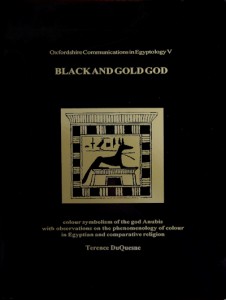Black and Gold God
 colour symbolism of the god Anubis
colour symbolism of the god Anubis
with observations on the phenomenology of colour
in Egyptian and comparative religion
Terence DuQuesne
(Oxfordshire Communications in Egyptology V)
NOW AVAILABLE AS A FREE PDF DOWNLOAD HERE
The subject of colour symbolism and usage in ancient Egypt has received little attention from scholars. By way of introduction, the author examines some of the philosophical postulates which underlie modern understanding of visual perception. He then gives a general consideration of colour terms and symbolism in the Egyptian context, with particular reference to the colour black and to Osiris km(y). Colours associated with the god Anubis are discussed, with details of relevant epithets, the symbolism of the imywt-emblem, the Spirits of the West, the canids in the Jumilhac Papyris, and colours in the Greco-Egyptian magical papyri. The author includes a comparative chapter on colour symbolism in various ancient and modern cultures. His concluding chapter offers some explanations of Egyptian symbolic colours and illustrates modern misconceptions about Egyptian attitudes to race and colour.
This study contains a contribution by Ahmed El Goresy and Solveig Schiegl on the physical properties of Egyptian pigments and their relevance to the ecological disaster which is affecting Theban tombs. It also includes an Annex by Andrzej Niwinski on black-painted coffins of the XXIst Dynasty. The work is thoroughly indexed and has a comprehensive bibliography.
DuQuesne uses the psychopompic figure of Anubis to ‘open the path’ into a significant problem of ancient Egyptian religion and its comparative exploration. In the pursuit of this investigation, he brings to bear an erudition which is truly impressive, not only in Egyptology but in the texts, languages and scholarship of many religious traditions, ancient and modern, as well as in philosophy and poetry. His intellectual stance is one of respect for all religions and of keen cross-cultural sensitivity; his writing style is forthright, vivid and literate. His presentation is informed by his deep engagement with the material he discusses and by his convinction that such studies are not a detached scholarly exercise but an urgent priority in the question for ethical life and for mutual and self-understanding.
– Edmund S Meltzer, Journal of Ancient Civilization
